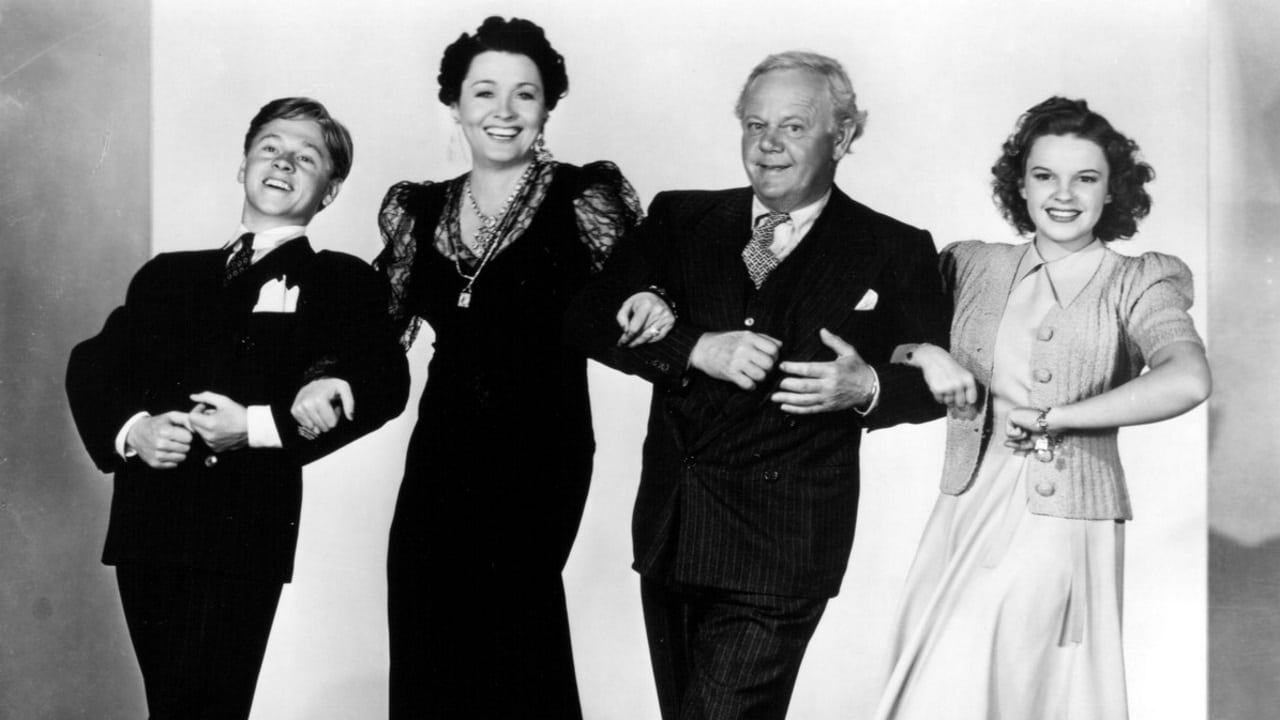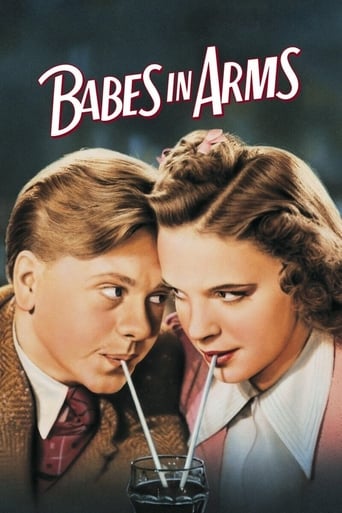



the audience applauded
Most undeservingly overhyped movie of all time??
Brilliant and touching
The biggest problem with this movie is it’s a little better than you think it might be, which somehow makes it worse. As in, it takes itself a bit too seriously, which makes most of the movie feel kind of dull.
View More'Babes in Arms' is one of Richard Rodgers and Lorenz Hart's best musicals, and one of their biggest successes, with wonderful songs (some of their best) and a witty script.This film version starring Mickey Rooney and Judy Garland doesn't come up to its level. Although "Lady is a Tramp" is heard in brief instrumental form, the best songs from the musical don't appear and the script does lack the wit and sharpness of the stage show's, instead feeling bland and flimsy. Other flaws are that the story does lack oomph and sometimes drags and the supporting cast are variable, with the best performance coming from a very good Margaret Hamilton, Betty Jaynes and Douglas McPhail sing beautifully.June Preisser and Charles Winniger are terribly annoying however. My biggest complaint however is the minstrel number, there is no denying that it is exuberantly performed but there is a lot to dislike about the number, it is not for the easily offended, it appears randomly, feels out of place, goes on for far too long and has to be up there as one of the most overblown scenes in early film musicals.Flaws aside, there is still a good deal to enjoy in 'Babes in Arms'. While it is a bowdlerisation adaptation-wise, the songs are still of good quality, it was interesting to hear "Good Morning", "Broadway Melody" and "Singin in the Rain", while "You are My Lucky Star" and especially the poignant "I Cried for You" are the standouts. "God's Country" is the sole misfire. The use of pre-existing material and operatic excerpts are also a delight, as are the sumptuous production values and lavish photography. Busby Berkeley's direction is not as imaginative, witty or dazzling as some of his other films, but it doesn't come over heavy-handedly and it has charm and energy, especially the clever staging of the title number.As said, the supporting cast are variable, but it's Mickey Rooney and Judy Garland that make 'Babes in Arms' worth seeing. Their chemistry shines beautifully, his brashness contrasting beautifully with her vulnerability. Rooney's performance does feel excessive and hammy sometimes and when it comes to the Oscar nomination he was nowhere near to the level of the other nominees in my opinion, however the boundless enthusiasm is there as is the charm. Garland is luminous and incredibly touching, her voice is also one that you can listen to for hours and not get enough of.On the whole, has a lot to like, especially Rooney, Garland and their chemistry, but it is patchy too. 6/10 Bethany Cox
View MoreJudy made an amazing transformation in the latter part of '39 from Dorothy in "The Wizard of Oz" into Mickey Rooney's girlfriend, in what amounts to a transformation of the Andy Hardy series into a musical drama: the first of a series of 4, 3 directed by Busby Berkeley, who also directed the spectacular finale of the 4th. The general construct of the subsequent films was established in this film, with a big production number toward the end of the first half, and another, representing the finale, with lesser musical numbers in between. Actually, in this film, in contrast to the subsequent films, we have two big production numbers toward the end. The first of these is the minstrel show, which serves as a model for the amazingly similar, in many ways, longer minstrel show in "Babes on Broadway". In both these shows, Mickey plays the stock minstrel character Mr. Bones, while Judy plays the stock character Mr. Tambo, who engage in a bit of inane dialogue with the MC. In both films, there is a brief soft shoe dance to a classic moon-based song: Mickey dancing to "Moonlight Bay" here, while Ray McDonald later danced to "By the Light of the Silvery Moon". These served as breathers in these mostly manic productions. In both films, Judy later ditches her blackface Mr. Tambo character to become a mulatto singer/dancer. Here, she sings "I'm Just Wild About Harry", with Mickey later joining in, then the chorus taking over as they dance wildly. This production lacks the latter part of the long minstrel show in "Babes on Broadway". It's like BB wanted to redo it with more of his typical features, such as some overhead projection shots and more chorus line shenanigans. If you are sensitive to blackface productions, especially involving stock minstrel characters, please skip these parts of these films. I don't have a problem.The rousing anti-fascist patriotic finale features the USA-praising song "In God's Country", which includes a variety of scenes and themes, some inane, sometimes with a big picture of the capitol in the background. In part, Mickey plays FDR. Actually, Judy is much better in imitating wife Eleanor during the fireside chat segment. Mickey's previous attempts to mimic other actors also fell rather flat, except perhaps for Eddie Cantor's "Ida". The first big production, unlike the more traditional comparable productions in the subsequent films, is the bizarre scene where the gang of thespian hopefuls march through the streets while singing, carrying torches and gathering crates for a bonfire which they dance around, while McPhail sings defiant verse from a podium. Yes, it does have the look of a Nazi rally, as some others have noted. But, it's really a symbolic burning of old vaudeville traditions. This scene was instigated by their disappointment in Mickey's father rejecting Mickey's new style of musical compositions and screenplays he proposed that his father help sponsor.This film can also be thought of as a model for some of Universal's wartime musical comedies starring young Don O'Connor and Peggy Ryan, who were Uiversal's version of Mickey and Judy. Most of their film series included an opera-styled teenage female singer, and occasionally a Nelson Eddy-type singer, who provided a sophisticated dimension to some of the music. We see the same thing here, which is lacking in the subsequent Mickey + Judy musicals. Douglas MnPhail's booming operatic voice dominates a number of scenes: most memorably the mob march and bonfire scene. He was a significant character in the screenplay, as well. Betty Jaynes, who plays Mickey's sister, was his female counterpart, and his off-screen wife at this time. They had one too brief and interrupted duet to the classic "When or Where", from the play "Babes in Arms". Betty also did a bizarre, very abbreviated, comedic, "You Are My Lucky Star". This prior Brown and Freed song, along with their new theme song "Good Morning" would again be featured in "Singing in the Rain". Very tragically, this singing duo would be doomed to brief film careers, as '30s-styled operettas were about to go out of style. Nonetheless, they certainly could have been used in other types of musicals or in straight dramatic roles. McPhail looked much like Clark Gable at his age, and, from what I saw, could have succeeded in purely dramatic roles. Alas, he soon became an alcoholic, and succeeded in a second suicide attempt a few years later. Veteran vaudeville-film actor Charles Winninger was the main character in the first portion of the film., savoring his life in the heyday of vaudeville and fathering a son who would become Mickey's character. With the advent of soundies, vaudeville went into a step decline, thus he advises Mickey and friends not to try to follow as a stage actor.June Preisser plays 'Baby' : the sexy blond daughter of a rich family whom Mickey has to play up to in order to hopefully obtain the financing for his show. His date with her in her mansion is rather comical. Naturally, Judy becomes jealous and wants to run away. But Baby's father pulls her from the lead female role in the show, giving Judy a chance to take her place....June would return to play a similar role in the next film in this series "Strike Up the Band". She was noted for the gymnastic and contortionist aspects of her 'dancing'.
View MoreWith the popularity of "talkies" (talking motion pictures), vaudeville stage performers find themselves increasingly out of work in the early 1930s. Practically born at the Palace Theatre, energetic teenager Mickey Rooney (as Michael "Mickey" Moran) tries to help out his parents and their generation of fading live performers by writing a stage show. His lead singer and potential love interest is spunky Judy Garland (as Patsy "Pat" Barton). However, there is a rival for Mr. Rooney's affections. Their Seaport, Long Island show could be destined for Broadway, but it's not all smooth sailing...MGM "teen idols" Rooney and Garland were more wholesome than those kids at other studios - especially the "Dead End" kids at Warner Bros. "Babes in Arms" entertained teens, parents - and even grandparents - with a cross-generational, albeit flimsy, story. It's a tuneful trip, despite being trimmed of some original stage songs; the medleys and production numbers make it seem bigger and more musical. This is Rooney's film, with director Busby Berkeley and co-star Garland more or less inviting you to join in and share his screen. Everyone does a good job for the star...You get the impression there isn't anything Rooney won't try. He postures throughout. The box office champ impersonates Clark Gable and Lionel Barrymore well but doesn't do Franklin D. Roosevelt justice. Be prepared to cringe at the "minstrel show" wherein Rooney and Garland lead the troupe in a "blackface" barnstormer. This entertainment staple comes across dreadfully; others, most specifically Al Jolson, could get under the colored skin and perform with pathos, dignity and a bit of respect. Here, you have stereotypical exaggeration, with no imagination.***** Babes in Arms (9/15/39) Busby Berkeley ~ Mickey Rooney, Judy Garland, Douglas McPhail, June Preisser
View MoreIt's an early Freed Unit picture, and among other Freed staples it has the work of Roger Edens, snatches of "Singing in the Rain" and "Good Morning," plus a whisper of "Broadway Rhythm." But it's kind of cuckoo. The director is Busby Berkeley, who wanted everything BIG even when the movie was supposed to be SMALL. Thus BB encourages the Mickster to go into his full Eugene O'Neill mode and he out-shouts everyone in the movie, including the hurricane! That is, when he's not on the verge of tears. If a woman had so over-heated, you'd say it's her time of the month; I can only guess Mick's ego went nuclear and BB wasn't interested enough to rein him in. He may not have even noticed. The most absurd stroke is that Rooney clearly believed he was a great impressionist too, and BB let him do crude impersonations of Gable and Barrymore, among others, that seem pointless and self- congratulatory. Judy is early Judy: shy, more Dorothy Gale than the windstorm of talent she'd become in later Freed masterpieces like "Meet Me in St. Louis" and so forth. Some other oddities, or at least they seem odd now: a big number in which Mick and the "kids" march through the streets of a Long Island coastal town, carrying torches and proclaiming that they are the future has an odd Nazi vibe to it. Creepy. Then there's baritone Doug McPhail who was five years from suicide; he's the next Nelson Eddy except there was no next Nelson Eddy which may be why he poisoned himself. Johhny Sheffield, later to be "Boy" to Johnny Weismuller's Tarzan, is briefly glimpsed and such MGM regs as Guy Kibbee and Margaret Hamilston are around to ground the movie in solid professionalism. It's sure watchable, even today, but now you think: these people thought they were riding the wave and the wave was coming in to crush THEM.
View More